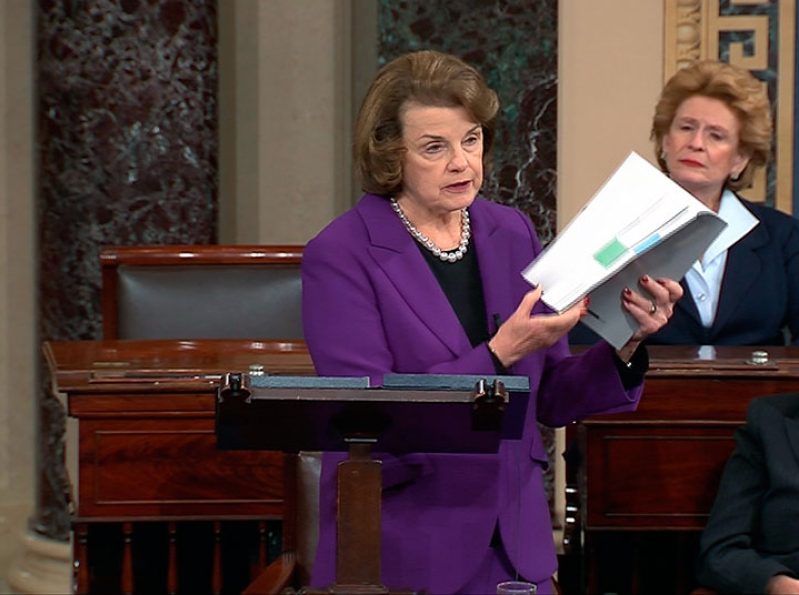
The Senate Intelligence Committee has released a report that details the use of "enhanced interrogation techniques" by the Central Intelligence Agency following the 9/11 attacks.
The unclassified version of the report, which can be found in its entirety on the Senate's website, revealed an unbelievable level of brutality and violence carried out by members of American intelligence. According to Josh Rogin and Eli Lake of Bloomberg View, Senate Democratic aides briefed reporters ahead of the release that President George W. Bush was "uncomfortable" with some of the practices once he knew the full scope of the CIA's actions.
"When Bush finally heard the details of the harsh interrogation techniques that were used against CIA detainees, he was 'uncomfortable' with some of them and expressed dismay that some detainees were required to remain in stress positions for long amounts of time, to the point that they had no choice but to soil themselves," Rogin and Lake wrote.
Stephen Collinson and Evan Perez wrote in a CNN article that the Senate's report indicated that the CIA's harsh interrogations on terrorist detainees during the Bush administration didn't work and failed to reveal any "ticking time bomb" information that prevented an attack. The techniques described in the report were "deeply flawed," poorly managed and often led to "fabricated" information.
Paul Vale of the Huffington Post described in graphic detail the interrogation techniques used against suspected terrorists, which some call torture. The report revealed that terrorism suspects were shipped to secret overseas prisons and subjected to waterboarding and other harsh techniques.
"Detainees were also subjected to threats of sexual violence using a broomstick and the use of 'rectal hydration,' with interrogations lasting days or even weeks," Vale wrote. "Food was also delivered rectally to break hunger strikes. Mock executions, prolonged sleep deprivation, stress positions and other forms of torture and cruel, inhuman and degrading treatment were also commonplace."
The report also accused CIA officials of keeping the White House and members of Congress in the dark regarding details of the interrogation program. Vale noted that while the report disclosed all 119 prisoners held by the CIA as terror suspects, 26 of them were held due to bad intelligence or mistaken identity.
"The CIA provided incomplete and inaccurate information to the White House regarding the operation and effectiveness of the detention and interrogation program," a committee document on the report states. "In addition to inaccurate statements provided to other policymakers, there were instances in which specific questions from White House officials were not answered truthfully or completely."
Vale added that the report concluded that the harsh techniques did not produce results or any intelligence breakthroughs.
The chair of the Senate Intelligence Committee, Sen. Dianne Feinstein, D-Calif., issued a statement on the report.
"The committee reviewed 20 of the most frequent and prominent examples of purported counterterrorism 'successes' that the CIA has attributed to the use of its enhanced interrogation techniques," Feinstein said. "Each of those examples was found to be wrong in fundamental respects."
Feinstein added that the CIA's actions shortly after 9/11 were a "stain on our values and on our history."
Vale noted that in its defense, the CIA questioned Feinstein's accusations and published a 100-page rebuttal justifying the use of the controversial techniques.
"The sum total of information provided from detainees in CIA custody substantially advanced the Agency's strategic and tactical understanding of the enemy in ways that continue to inform counterterrorism efforts to this day," the spy agency said. "It is impossible to imagine how CIA could have achieved the same results in terms of disrupting plots, capturing other terrorists, and degrading al Qaida without any information from detainees, but it is unknowable whether, without enhanced interrogation techniques, CIA or non-CIA interrogators could have acquired the same information from those detainees."
CIA Director John Brennan said that although his agency "did not always live up to the high standards that we set for ourselves," the CIA has "learned from these mistakes" and will implement "various remedial measures over the years to address institutional deficiencies."
CNN reported that the report's release has reignited the partisan divide over combating terrorism that dominated Washington a decade ago.







